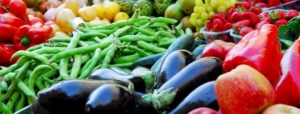Low Consumption Rates + Studies = End to Promoting Fear (Or It Should)
2/21/2017 10:07 AM
Last year we posted a popular blog which focused on some groups moving away from disparaging non-organic products in favor of the main message of the Alliance for Food and Farming (AFF): “Eat more organic and conventionally grown fruits and veggies every day for better health and a longer life – both are safe and can be consumed with confidence.”
While we have been gratified watching this messaging evolution by certain groups in favor of more positive, nutrition information, some organizations have shown they will still cling to the old-style negative messaging to promote one production method over another. However, peer reviewed studies are showing this old-style messaging may be adversely impacting consumers by creating another barrier to produce consumption – fear.
In a peer reviewed study published in September 2016, researchers at the Illinois Institute of Technology’s (IIT) Center for Nutrition Research surveyed 510 low income consumers in the greater Chicago area to learn more about what terms and information about fruits and vegetables may influence their shopping intentions. Among the key findings, messaging which inaccurately describes certain fruits and vegetables as having “higher” pesticide residues results in low income shoppers reporting that they would be less likely to purchase any fruits and vegetables – organic or conventional.
The IIT researchers patterned this messaging on the “dirty dozen” list. The authors of the “dirty dozen” list, the Environmental Working Group (EWG), have been among the biggest culprits of promoting inaccurate and fear-based messaging about non-organic produce. While their decades-old “dirty dozen” list has been discredited by the scientific community, EWG continues to release a new list every spring albeit to ever-declining interest.
Researchers at the John Hopkins Center for a Livable Future also conducted a study to learn more about the way food is understood within consumers’ definitions of healthy. This study was published in the journal Culture, Agriculture, Food and Environment in January 2015.
Specific to produce and pesticide residues, the researchers included this example in their paper:
“Some participants acknowledged that they hear competing health messages about foods which might conflict with other health benefits of the food, such as nutritional value. One participant described health messages about the importance of eating apples being contradicted by other messages warning of the effects of pesticides”
Both the IIT and John Hopkins studies show that groups like EWG are confusing consumers and undermining efforts to promote healthy eating with their contradictory, fear-generating messaging. This is especially concerning since the Centers for Disease Control reports that only 1 in 10 Americans is eating enough fruits and vegetables each day.
These low consumption rates combined with peer reviewed studies showing the negative impact these inaccurate messages may be having on consumers should convince more and more groups to move away from this tactic. Come spring, we will see if EWG will join them.
Read, learn, choose but eat more fruits and vegetables every day for better health and a longer life.




Leave a Reply
Want to join the discussion?Feel free to contribute!